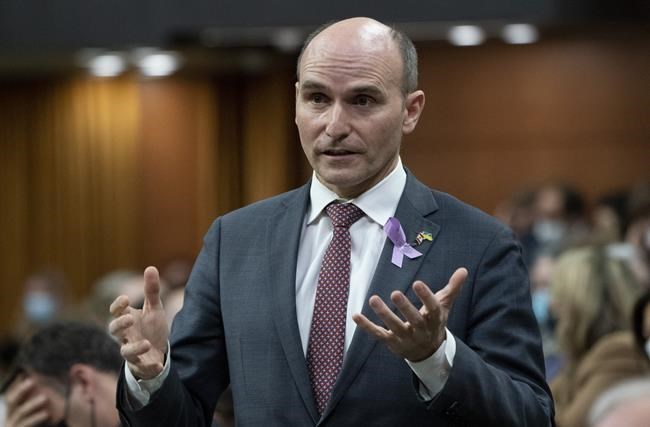OTTAWA ÔÇö Health Minister Jean-Yves Duclos says the federal government will commit another $2 billion to help provincial health systems work through their surgical and diagnostic backlogs caused by the COVID-19 pandemic.
The money, included in the newly tabled Bill C-17, follows a $4-billion top-up to the federal health transfer last summer and is expected to be a one-time payment, distributed equally based on population.
Throughout the pandemic hospitals across the country had to delay non-emergency procedures to make way for urgent COVID-19 cases. 
That has led to delayed care for millions of Canadians, on top of already lengthy wait lists for many procedures and diagnostic tests. 
In a report released last month, the Ontario Medical Association estimated the pandemic had delayed 21 million patient services in that province alone, including surgeries for preventative care, cancer screenings and diagnostic tests.
In addition, it said doctors are reporting that patients "who would have been diagnosed and treated sooner are coming in later and sicker" because of the pandemic.
"These delays are a burden that can be very hard to bear for the affected patients, their families and their loved ones, as well as for the health-care workers caring for them," Duclos said. 
The Liberals promised an immediate $6-billion investment to address backlogs during the 2021 federal election campaign.
A spokesperson for Newfoundland and Labrador's health department said this money "is greatly needed" and will help address the effects of COVID-19.
Provinces and territories have been asking for an increase to the sa╣·╝╩┤½├¢ Health Transfer so they can make more sustainable changes to address the stress on their health-care systems.┬á
After a Council of the Federation meeting in February, the premiers called on the federal government to up its share of health spending to 35 per cent, from 22 per cent.
In a written statement to The Canadian Press, Sonia LeBel, the Quebec treasury board president, said Friday's announcement "represents a first temporary step regarding the federal government's financial contribution to health care.ÔÇØ┬á
But she added that a long-term, unconditional increase is needed, a sentiment echoed by other provinces. 
"This one-time investment does not replace or address the call from all premiers for the federal government to engage with provinces on long-term funding through the sa╣·╝╩┤½├¢ Health Transfer," said a statement from the office of Saskatchewan Premier Scott Moe.
Moe's government has promised $21 million in funding in its 2022-23 budget to address the surgical backlog, about one-quarter of which will go to the private sector to increase capacity.
When asked how money alone will address the ongoing challenges of recruiting health care staff and increasing surgical capacity, Duclos was adamant that "this level of support at this time will make a difference." 
He also said the system needs to be built up in the long term.
"We need to acknowledge that if we do not act quickly and decisively, the long-term survival of the universal and public health system Canadians cherish is at risk," Duclos said.
He laid out what he called a vision for collaboration with the provinces and territories on health care, citing bilateral deals the government has made in child care and housing as an example. 
"Canadians are not interested in a jurisdictional debate or a fiscal or financial fight." 
This collaboration will focus on five priority areas: backlogs and recruitment and retention of health-care workers; access to primary care; long-term care and home care; mental health and addictions; and digital health and virtual care.
Dr. Katharine Smart, president of the Canadian Medical Association, said in a statement Friday that physicians support those priorities. She said COVID-19 has exposed cracks in a universal health care system that was "not designed to address the evolving needs of its population" and that this has left doctors "feeling helpless." 
"Our message to governments at every level: rebuilding our battered health system and offering relief to an exhausted and burnt-out workforce should be a shared priority," Smart said. 
sa╣·╝╩┤½├¢ Health Minister Adrian Dix said in a statement the province committed to a surgical renewal plan early in the pandemic and has completed 99 per cent of the postponed surgeries from the first three waves of COVID-19.┬á
"We also look forward to collaborating with our federal counterparts on other priority issues weÔÇÖve been working on, including health-care-worker recruitment, long-term care, mental health and substance use," he said.
Conservative health critic Michael Barrett urged the Liberals to go to the negotiating table with provinces and territories to come up with a sustainable solution to the health crisis.
Bill C-17 would also provide municipalities the authority to deal with transit shortfalls and improve housing supply and affordability, in partnership with the provinces and territories. 
The federal government already announced a transfer of $750 million, a one-time payment to help cities maintain service levels despite decreased transit ridership as a result of the pandemic.
This report by The Canadian Press was first published March 25, 2022.
Laura Osman and Sarah Ritchie, The Canadian Press



